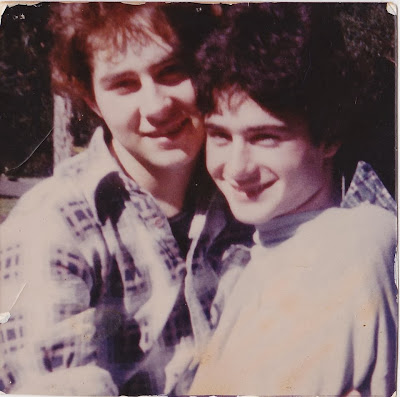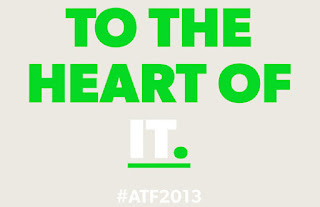Holding the Man: The Three Champions of Australia's Greatest Love Story
Last week, before a preview screening in Brisbane
of the film version of Holding the Man, I joined writer Tommy Murphy for a
public talk about how the story came to be, first as memoir, then as theatre,
and now as film.
It was lovely to be with Tommy, such a crucial
figure in how this story has reached a wider audience, and to reflect on what
is now a 20-year history adorning the 15-year relationship between Timothy
Conigrave and the man he called his husband, John Caleo.
Tim was an actor and playwright, but his final form
was memoir. Following John’s death on Australia Day 1992, Tim was determined to
write a book about his lover. In an interview with James Waites for a National
Library oral history project on HIV/AIDS in Australia, Tim says
‘The only thing I have to live for is these two things that I am writing, which I’d like to finish both of. One’s a play that involves stuff about AIDS but it’s not really about AIDS, and the other one is the book that I’d like to write about my lover and I, which I’ve started.’
The interview itself is quite extraordinary. Over
almost three hours, recorded at his home in Sydney on 13 January 1993, Tim
tells stories of his life, his time with John, and his current health. Many of
these stories are clearly well rehearsed, probably told at hearty dinner
parties, and many are in a form similar to how they’d eventually arrive in the
book.
Two weeks before this interview, Tim met the first
of several people who have been crucial to how this story came into the world,
and to how it has endured. At a New Year’s Eve party in Melbourne’s St Kilda in
1992, Tim met Sophie Cunningham.
 |
| Sophie Cunningham |
Tim told Sophie one, or a few, of those long-rehearsed stories. Then, in a fateful moment, he whispered to her that he
wanted to write a book.
‘You’re not interested in this’, said Tim with uncharacteristic, but perhaps strategically placed doubt. ‘Tim, I’m a publisher,’ replied Sophie, fascinated. Now a highly regarded novelist, Sophie was then working at McPhee Gribble/Penguin.
Sophie commissioned the book.
In June 1993, Tim faxed her two short stories from
the ACON office. One, “The First Boy I Loved”, had already been published
in Outrage, a Melbourne-based gay magazine. Then Tim would send new
chapters to Sophie. ‘It was in rough shape, but I knew I was onto something
special,’ Sophie told Benjamin Law years later. ‘There was something about the voice, clarity, humour and directness of it.
It’s the book I’m most proud of having published.’
In September the following year, Tim delivered the
completed draft to Sophie over lunch, then died a few weeks later. ‘It’s like
he held himself together through sheer force of will,’ Sophie told Ben. True to his
character, the last thing Tim ever said to Sophie was that she looked good
blonde, and should keep her hair that way.
There was a person helping Tim as he prepared the
book for his publisher – the second crucial figure in this story – Nick Enright.
 |
| Nick Enright |
Nick was Tim’s acting teacher at NIDA. Nick was not
only one of our finest teachers, but also a talented writer, principally of
plays. He also had a superior talent for supporting talent in others. Nick, only nine
years older than Tim and also gay, saw in Tim someone capable of making a
difference. How shrewd Nick was.
Nick helped Tim shape the book. Early on, Tim wanted to write the story as fiction - the story of two boys who fell in love.
But all those around him, including Nick, urged him to write the story as
memoir.
I saw some of Nick's shaping first hand. In early
1994, I was living in Nick’s house in Sydney. At that time, Nick often visited
Tim in hospital, or at other places, working on drafts of chapters. Nick knew
that Tim’s health was failing, and that working on the book was probably
keeping Tim alive.
Typed copies of draft chapters sat on top of Nick's
piano. I would read these loose A4 pages, struck and intrigued by the things
that would later come to mean so much to me and others. I would also be amused
at Nick's furious corrections of Tim's punctuation. IT'S = IT IS!, the thick
pencil would often scream. It seemed natural that Nick would become Tim’s
literary executor.
These notated drafts, along with the galley proofs
Nick corrected for McPhee Gribble/Penguin, now sit with the rest of Nick’s
papers in the Australian Defence Force Academy Library in
Canberra.
Tim and Nick were playwrights, men of the theatre,
and they gave the memoir a scenic shape and a lean, dramatic thrust with crisp,
honest dialogue. They could see the value of the Romeo and Juliet motif,
and enjoyed sequences set in theatres and drama school. It is perhaps a natural
part of this story that the third crucial figure in its history is also a
playwright – Tommy Murphy.
 |
| Tommy Murphy |
In 2005, when I was Artistic Director of Griffin
Theatre Company, the very theatre where Tim had been so involved, I asked Tommy
to adapt the book for the stage. Tommy and I had enjoyed many theatrical
endeavours together, and I was keen to challenge him. To my surprise, he had
not read the book. But on reading it, in April of that year, he accepted the
mission and began working out how to turn memoir into drama.
I've written elsewhere about
how we shaped this story onto the stage, and Tommy has also written about
he has lived with the possibilities of Holding the Man for
stage and screen. That is now a remarkable ten year history.
Tommy has held this story in his hands with love.
Early on, he was thoroughly systematic in breaking
the book down into little story bits. That excel spreadsheet is vast and full
of speculation. He contacted pretty much anyone he could find who appeared in
the book, and sometimes spoke at length with them, sometimes finding himself
counsellor or confessor.
Others contacted him, and he was always ready for conversation. He consulted
with those who were, in the book’s time, on the frontline of the HIV/AIDS
battles.
Later, he would grow close to the Conigrave family,
ensuring that they felt comfortable with how he was transforming their son’s
story. Over many years, they gave him their trust, and their love.
Through ten years, through many iterations of the
play and as the film found definition and then full life, Tommy has been the
caretaker of this story. I can’t imagine anyone else possessing better qualities
for the task. Tommy has the generational distance – probably a telling factor – but also the right mix of humour, sensitivity and hunger for living. Tommy rejects the sentimental in his life and in his art, and this has been critical for a sure sheparding of this story. All along the way, he has shown an open heart, enormous
generosity and a genuine love and respect for his two subjects. Oh, and then there’s the enormous
talent. We have much to thank him for.
Of
course, many others have been champions. Tony Ayres, who befriend Tim towards
the end of his life, has been a constant and kind advocate. Cameron Huang, who
saw the play and immediately had a vision for a film, has been the angel
investor without whom a film would have been unlikely. Rosemary Blight and Kylie
du Fresne of Goalpost Pictures, who saw early on the role this story could play
on film, have driven the enterprise to fruition with heart and clear dedication.
Neil Armfield, who directed the fine film, has contributed his trademark eye for
human detail. And of course Anna Davison, Tim’s sister and now literary
executor, has been the astute and generous gatekeeper ever since Tommy and I first made
contact with her.
All of these people have played full parts.
But Sophie, Nick and Tommy are the three who have enabled this story to flow freely
into the world. Without them, and their very particular qualities, there would
not be a memoir, a play or a film. Without them, this story of two adoring men,
held back from holding each other, would not be on our bookshelves or in our
hearts. Without them, the world would be a little less informed, a little less empathetic,
and a little less loving.


Comments
Post a Comment